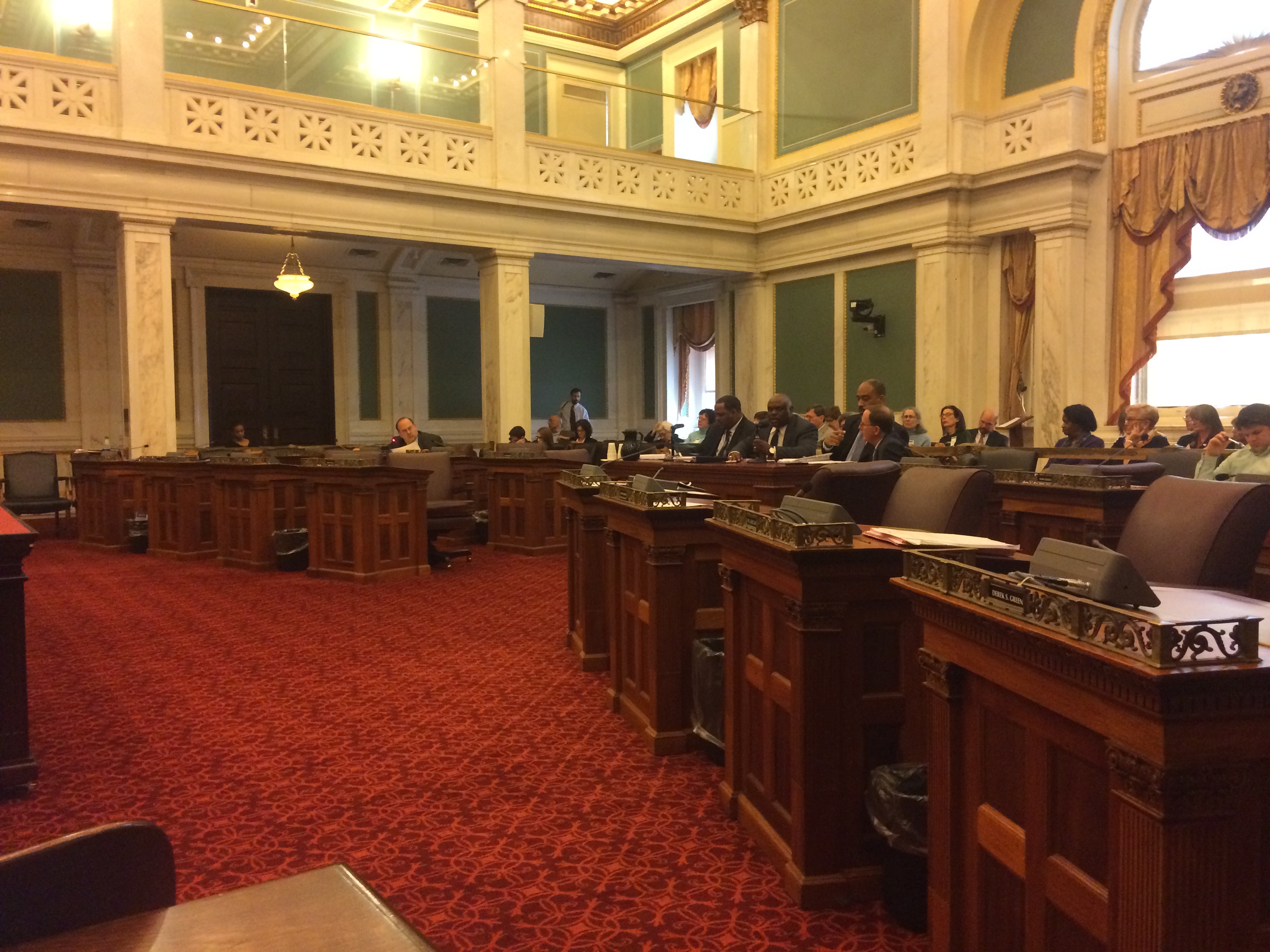Council largely skips Streets Department budget hearing

City Council had few pointed questions for the Streets Department brass at yesterday’s budget hearing. Instead, two less critical questions of the same flavor dominated: How can my district get more trash cans? How can my district get more speed bumps?
The councilmembers meant speed humps, explained Mike Carroll, deputy commissioner of transportation at Streets. Speed bumps are the taller, more narrow ridges found in some private parking lots, said Carroll, whereas speed humps are the shorter, wider, gentler speed reducer used on city streets. In Philadelphia, Streets deploys speed cushions — humps with strategically measured gaps in them to allow emergency vehicles to shoot through without reducing speed.
Councilmembers Cherelle Parker and Cindy Bass both said their constituents frequently asked them to install more speed humps in their Northwest Philadelphia districts. Carroll directed both of them to the Streets Department website, which directs residents to get 75 percent of their neighbors to sign a petition supporting the change . After that, the resident should send the petition to their local district councilmember, according to the Streets website.
Carroll cautioned that Streets could only build them on the roads it controls. PennDOT controls about 500 of Philadelphia’s 2,575 miles of streets, and they generally resist traffic slowing measures on their arterial routes, noted Carroll.
Parker and Bass also inquired about the possibility of getting more trash cans along commercial corridors, with Parker asking about the wire rim baskets that the city puts out for large foot traffic events to supplement its standard complement of 1,000 BigBelly trash cans and recycling bins. Commissioner Donald Carlton noted that deploying the 600 wire rim cans would significantly increase the department’s operating costs, as those need to be emptied multiple times a day, whereas the BigBelly cans only need to be serviced 4 times a week.
Parker asked about expanding a Streets pilot program that increased the size of the city’s recycling bins. Carlton responded that going citywide would cost $30 million — the new bins cost $40 each. The pilot showed that recycling increased about 30 percent with the larger bins, though, which might allow the city to recoup some of the upfront expenses, provided that the commodity market for recycled materials recovers. Last year, the city paid about $1.6 million in recycling processing fees, an amount the Streets budget projects will increase to $1.8 million this year. In prior years, recycling processing generated around $3 million a year in revenues. Larger bins increase processing costs, as they encourage people to throw in more unrecyclable materials.
Bass also asked Carlton about the possibility of Philadelphia converting its fleet of trash compactor trucks to the automatic pickup trucks seen in some suburbs. Carlton said that the Department looked into the switch two years ago, but the particularities of city life made it infeasible.
It takes 11 seconds on average for a sanitation crew to clear the trash of two houses, said Carlton. The “robocan” trucks take around 23 seconds. In order to make up for the lost time, Philadelphia would need 30-40% more compactor trucks. It would also require residents to not park in the street in front of their homes, an unfathomable proposition throughout most of Philly’s rowhouse neighborhoods.
Streets Department is requesting $126 million in operational funds this year, plus another $62 million in capital funding. As far as spending goes, Streets is the fourth largest city department, behind Police ($650 million), Prisons ($259 million) and Fire ($221 million). Streets has a large workforce of 1,804 budget positions. Most come from the sanitation side: 1,228 employees work in sanitation, including 838 collection and street cleaning workers.
Despite the relatively large size of Streets, most City Council members skipped the hearing. Only hearing chairman Bill Greenlee and Alan Domb sat through the hearing in its entirety. Domb focused questions on Streets relatively large rental and overtime expenses last year, wondering if additional capital funds and more hiring could fix those problems. Commissioner Carlton responded that those spikes were caused by this winter’s unusually high snowfall—Streets rented extra trucks and pressed staff into overtime to man them. Street’s budgets its snow removal expenses based on the 5 year average costs. Last winter, the city spent $8.5 million on snow removal, $3.3 million more than the $5.2 million budgeted. This year, Streets budget for snow removal remains fixed at $5.2 million.
In addition to Parker, Bass, Domb and Greenlee, councilmembers Brian O’Neill, Mark Squilla and Darrell Clarke attended parts of the hearing. The chair of City Council’s transportation committee, Kenyatta Johnson, did not attend.*
*Correction: This sentence has been corrected with Councilman O’Neill’s correct first name.
WHYY is your source for fact-based, in-depth journalism and information. As a nonprofit organization, we rely on financial support from readers like you. Please give today.




